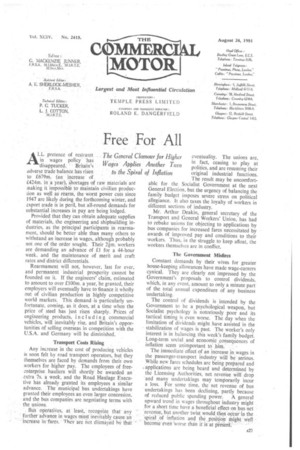Free For All
Page 29

If you've noticed an error in this article please click here to report it so we can fix it.
disappeared. Britain's L pretence of restraint in wages policy •has tu AL adverse trade balance has risen to the Spiral to £679m. (an increase of, f.424m in a year), shortages of raw materials are making it impossible to maintain civilian production as well as rearm, the wort power cuts since 1947 are likely during the forthcoming winter, and export trade is in peril, but all-round demands for substantial increases in pay are being lodged. Provided that they can obtain adequate supplies of materials, the engineering and shipbuilding industries, as the principal participants in rearmament, should be better able than many others to withstand an increase in wages, although probably not one of the order sought. Their 2im. workers are demanding an advance of El for a 44-hour week, and the maintenance of merit and craft rates and district differentials.
Rearmament will not, however, last for ever, and permanent industrial prosperity cannot be founded on it. If the engineers' claim, estimated to amount to over £100m. a year, be granted, their employers will eventually have to -finance it wholly out of civilian production in highly competitive world markets. This demand is particularly unfortunate, coming, as it does, at a time when the price of steel has just risen sharply. Prices of engineering products, including commercial vehicles, will inevitably rise, and Britain's opportunities of selling overseas in competition with the U.S.A. and Germany will be diminished.
Transport Costs Rising Any increase in the cost of producing vehicles is soon felt by road transport operators, but they themselves are faced by demands from their own workers for higher pay. The employees of freeenterprise hauliers will shortly be awarded an extra 7s. a week, and the Road Haulage Executive has already granted its employees a similar advance. The municipal bus undertakings have granted their employees an even larger concession. and the bus companies are negotiating terms with the unions.
Bus operatiVes, at least, recognize that any further advance in wages must inevitably cause an _ . further advance in wages must inevitably cause an _ . increase in-fares. They are not dismayed by that eventuality. The unions are, in fact, ceasing to play at politics, and are resuming their original industrial functions. The result may be uncomfortable for the Socialist Government at the next General Election, but the urgency of balancing the family budget imposes severe stress on political allegiance. It also taxes the loyalty of workers in different sections of industry.
Mr. Arthur Deakin, general secretary of the Transport and General Workers' Union, has had to rebuke unions for objecting to applications by bus companies for increased fares necessitated by awards of improved pay and conditions to their workers. Thus, in the struggle to keep afloat, the workers themselves are in conflict.
of Inflation
The Government Misfires Constant demands by their wives for greater house-keeping allowances have made wage-earners cynical. They are clearly not impressed by the Government's proposals to control dividends, which, in any event, amount to only a minute part of the total annual expenditure of any business undertaking.
The control of dividends is intended by the Government to be a psychological weapon, but Socialist psychology is notoriously poor and its tactical timing is even worse. The day when the limitation of dividends might have assisted in the stabilization of wages is past. The worker's only interest is in balancing this week's family budget. Long-term social and economic consequences of inflation seem unimportant to' him.
The immediate effect of an increase in wages in the passenger-transport industry will be serious. While new fares schedules are being prepared and applications are being heard and determined by the Licensing Authorities, net revenue will drop and many undertakings may temPorarily incur a loss. For some time, the net revenue of bus undertakings has been declining, partly because of reduced public spending power. A general upward trend in wages throughout industry might .for a short time have a beneficial effect on bus net revenue, but another twist would, then ocbui in the 'spiral of inflation and the p9sition. Might well become'even 'worse than it 'is at pesent




















































































